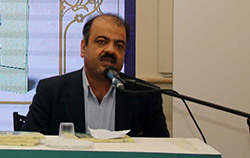The Lack of Attention to the Types of Utilization in Oral History
Akram Dashtban
Fazel Shirzad
2018-7-31
The following text is created based on this question and this field:" What are the pattern of work in the oral history for the rest? Why are these books pattern and what are their characteristics?
Abolfazl Hassanabadi, the director of documents and press unit of Astan Quds Razavi’s[1] Library, said:" The book" Oral History Guide" by Donald Rich can be just named here. Some books, published in the field of oral history, only have the name of oral history but they are not used in their original form.

Referring to a book written in the field of oral history, he added: "The book "Oral History in Iran" is one I have written in this field, in which I have tried to present a definition of oral history based on world standards and paid partly attention on its situation in Iran. Of course, along with the two series articles, I have written about "Interview in Oral History" and "Methodology and Subjects in Urban Studies" that can help the readers in this field.
Hassanabadi went on to say:" Dr. Morteza Nouraee has also written a book entitled "Oral History and Its Place in Iran's Contemporary Historiography in 1358-1385[2]" and said that oral history is an audio or video interview on a topic. Mr. Tatari has also published a book titled "Compilation in Oral History," which was the result of a series of articles on the subject of Oral History. Hassanabadi added:" in the year 1370(1991), Mrs. Bam published a book entitled "Transcription and Editing in Oral History," which somewhat defined a framework, but it should be noted that oral history has a structure and a fluid, diverse nature, and it can't be put in one framework. The standard principles of it should be regarded in order to have an oral history format."
Hasanabadi continued: "Oral history has a separate structure in each of its formats and may have a challengeable structure, or they are different from each other in terms of subject and narration, but there are in common principles on which the title of oral history takes place. Here, we have to categorize the frameworks and model them, and book's approach should be taken into account in compiling the book, which is, as a sample of the book, a literary approach, or a combination of story and reality, or like Mr. Mohsen Kazemi's books, has a particular approach and cannot be considered as an arbitrary one."
He explained standard principles in oral history: "The purposefulness of an interview, audio or video, the presence of the interviewee and interviewer is standard principles in oral history. We may meet standards in the initial production of oral history, but we are so different about using it that there are various types of oral history in the world. Regarding the use of oral history in Iran, of course, we are dropped behind and generally know it only belong in published books."
[1] It is a charitable foundation, in Mashhad, Iran. It is the administrative organization which manages the Imam Reza shrine and various institutions which belong to the organization.
[2] 2006-1979
Number of Visits: 3459








The latest
Most visited
Hajj Pilgrimage
I went on a Hajj pilgrimage in the early 1340s (1960s). At that time, few people from the army, gendarmerie and police went on a pilgrimage to the holy Mashhad and holy shrines in Iraq. It happened very rarely. After all, there were faithful people in the Iranian army who were committed to obeying the Islamic halal and haram rules in any situation, and they used to pray.A section of the memories of a freed Iranian prisoner; Mohsen Bakhshi
Programs of New Year HolidaysWithout blooming, without flowers, without greenery and without a table for Haft-sin , another spring has been arrived. Spring came to the camp without bringing freshness and the first days of New Year began in this camp. We were unaware of the plans that old friends had in this camp when Eid (New Year) came.
Attack on Halabcheh narrated
With wet saliva, we are having the lunch which that loving Isfahani man gave us from the back of his van when he said goodbye in the city entrance. Adaspolo [lentils with rice] with yoghurt! We were just started having it when the plane dives, we go down and shelter behind the runnel, and a few moments later, when the plane raises up, we also raise our heads, and while eating, we see the high sides ...The Arab People Committee
Another event that happened in Khuzestan Province and I followed up was the Arab People Committee. One day, we were informed that the Arabs had set up a committee special for themselves. At that time, I had less information about the Arab People , but knew well that dividing the people into Arab and non-Arab was a harmful measure.

